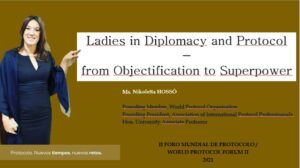 Recently, during the Second World Protocol Forum between the 27-29th of May 2021 in Argentina, an exciting new initiative was published during the very first lecture. The presentation, held by Ms. Nikoletta Hossó (OMP Founding Member and President of the Association of International Protocol Professionals, from Hungary) was an immediate success: since then, numerous OMP members have expressed their agreement and support to officially mark May 11th the International Day of Protocol and Protocol Professionals. The proposal was welcomed by the conference attendees as well, making it clear just how important a designated day for protocol professionals would be.
Recently, during the Second World Protocol Forum between the 27-29th of May 2021 in Argentina, an exciting new initiative was published during the very first lecture. The presentation, held by Ms. Nikoletta Hossó (OMP Founding Member and President of the Association of International Protocol Professionals, from Hungary) was an immediate success: since then, numerous OMP members have expressed their agreement and support to officially mark May 11th the International Day of Protocol and Protocol Professionals. The proposal was welcomed by the conference attendees as well, making it clear just how important a designated day for protocol professionals would be.
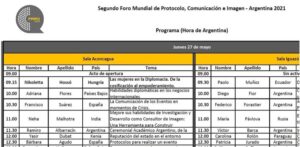
Protocol matters. It is a unique term for embracing tradition, interconnectedness and innovation. Protocol is an interdisciplinary field without which diplomacy would not function and no interstate communication would occur in the world. It is a high-risk, impactful profession, therefore a body of experts without whom no high-level ceremonies could take place. The world we know simply would not exist without it: several other fields of science and countless professions depend on it every day. How come the experts of this insanely complex field have yet to receive their very own international day?
 The solution and the suggestion are brought to us by Ms Hossó: May 11th is not at all just a day in your calendar: In 868, a copy of the Diamond Sutra was printed in China, making it the oldest known dated printed book. In 1997, Deep Blue, a chess-playing supercomputer, defeated Garry Kasparov in the last game of the rematch, becoming the first computer to beat a world-champion chess player in a classic match format.
The solution and the suggestion are brought to us by Ms Hossó: May 11th is not at all just a day in your calendar: In 868, a copy of the Diamond Sutra was printed in China, making it the oldest known dated printed book. In 1997, Deep Blue, a chess-playing supercomputer, defeated Garry Kasparov in the last game of the rematch, becoming the first computer to beat a world-champion chess player in a classic match format.
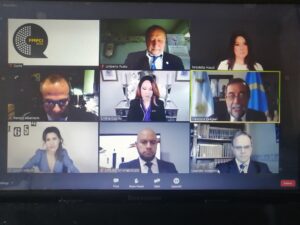 OMP has been seeking the common grounds of all concerned and affected parties and found a neutral date that everyone may agree to, regardless of nationality, faith, age, gender, rank or position.
OMP has been seeking the common grounds of all concerned and affected parties and found a neutral date that everyone may agree to, regardless of nationality, faith, age, gender, rank or position.
For this reason OMP decided to turn to History and search for protocol related events supported by proven facts.

Etymology: the term derives ultimately – via French and Medieval Latin – from Ancient or Byzantine Greek πρωτόκολλον (= prōtokollon: „first sheet glued onto a manuscript”; derived term: Latin: prōtocollum) as from the 7th century onwards, Greek was the only language of administration and government in the Byzantine Empire.
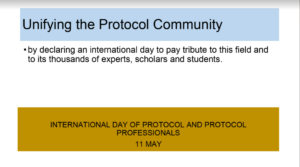 History: the beginning of Byzantine Greek language is occasionally dated back to as early as 330 AD, when the political centre of the Roman Empire was moved to Constantinople. It was famous for its architectural masterpieces, and centre of culture and education of the Mediterranean basin, was the largest and wealthiest city in Europe from the mid-5th century to the early 13th century, capital city of the Roman Empire (330–395), the Byzantine Empire (395–1204 and 1261–1453), the brief Crusader state known as the Latin Empire (1204–1261), and the Ottoman Empire (1453–1922).
History: the beginning of Byzantine Greek language is occasionally dated back to as early as 330 AD, when the political centre of the Roman Empire was moved to Constantinople. It was famous for its architectural masterpieces, and centre of culture and education of the Mediterranean basin, was the largest and wealthiest city in Europe from the mid-5th century to the early 13th century, capital city of the Roman Empire (330–395), the Byzantine Empire (395–1204 and 1261–1453), the brief Crusader state known as the Latin Empire (1204–1261), and the Ottoman Empire (1453–1922).
The ancient city of Byzantium was renamed “New Rome” in 324 and declared the new capital of the Roman Empire by Emperor Constantine the Great after whom it was renamed, and dedicated on 11 May 330.
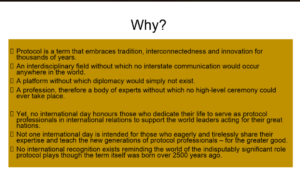 Protocol: a term born in Byzantine Greek, on a soil consecrated on 11th May 330, home to emerging empires all the way till the 20th century.
Protocol: a term born in Byzantine Greek, on a soil consecrated on 11th May 330, home to emerging empires all the way till the 20th century.
Constantinople was not only the cradle, the birthplace for the term protocol but also for Constantine VII “the Purple-born” (he was also raised to co-emperor in the month of May). He had active diplomatic relationships with foreign courts, he was a passionate book collector and a generous patron of scolars although he is best remembered within the community of protocol professionals for his manuals on ceremonies (De ceremoniis aulae Byzantinae) in 956–959. These protocols gave rules for imperial progresses to and from certain churches at Constantinople and the imperial palace. These manuals were also the foundation of the later evolved etiquette at the French and Spanish courts in the 16-17th century. His father, Alexander became Emperor of the Byzantine Empire on 11th of May, 912.
Upon historic facts OMP agrees to designate 11th of May to celebrate Protocol.
The international professional scene shall be turning to the special representatives to the UN to start the official procedure of adopting an international day recognised by the UN.




